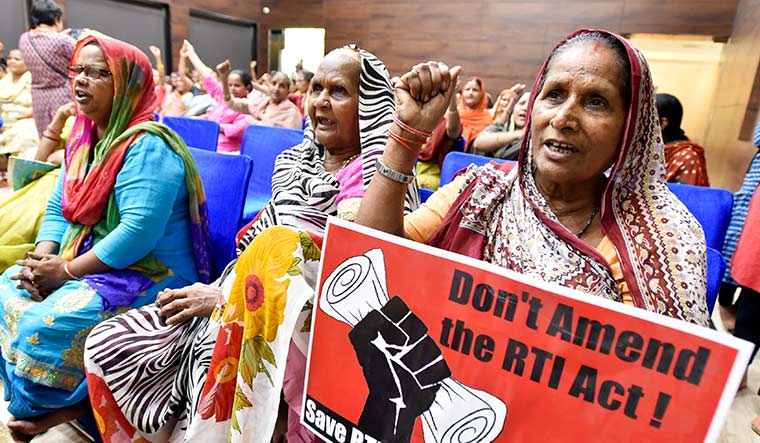ON JULY 19, 2018, Union Minister of State Jitendra Singh was set to introduce the bill to amend the Right to Information (RTI) Act, 2005, in the Rajya Sabha. The amendment would have allowed the Centre to fix the tenure and salaries of Central and state information commissioners, thereby changing their status that was at par with that of Supreme Court judges and election commissioners. But RTI activists took to the streets, saying the proposed amendments were an assault on the transparency law. Opposition parties, too, voiced their protest. And, the government blinked, not wanting to make it a poll plank in the last year of its term.
This July 19, Singh introduced the same bill in the Lok Sabha, despite protests from the opposition. This was no coincidence, but the Modi government’s way of showing that with the massive mandate it got in the recent polls, it could bring in legislations it deemed fit. “The earlier act, brought in haste, was clumsy,” said Singh. “We are making changes and strengthening transparency.”
On July 22, the bill was passed in the Lok Sabha. If the Rajya Sabha, too, gives a go-ahead, the RTI Act will be amended for the first time. But it will not be easy as the opposition will push it to be referred to the standing committee, which is, ironically, yet to be constituted.
The 14-year-old RTI movement, which gave people power to question the authorities, had begun to show signs of slowdown as the authorities were stonewalling information. Even the mandatory proactive disclosure of information on government websites, which could reduce RTI applications by over 60 per cent, was not being done. More than 80 activists had been killed in the past few years. Even the United Progressive Alliance government, which first brought in the act, tried to amend it, but backed off owing to protests.
“There are several problem areas,” said activist Nikhil Dey, “but the government’s move to bring these amendments show that even this RTI Act was enough to scare them.” Anjali Bhardwaj, co-convener of the National Campaign for People’s Right to Information, said the government wants to create caged parrots in the Central Information Commission (CIC). “The government does not want to give information as people are asking questions on demonetisation and jobs,” said Bhardwaj, founding member of Satark Nagrik Sangathan, adding it had stonewalled information in the Rafale deal and about the prime minister’s foreign tours and educational degrees.
The opposition sought to know why the bill was not put up for public discussion before its introduction in the Lok Sabha. UPA chairperson Sonia Gandhi, whose National Advisory Council was instrumental in steering the 2005 bill, said that the Central government saw the RTI Act as a “nuisance” and wanted to destroy the status and independence of the CIC.
As per the amended act, the tenure, salary and conditions of service of all information commissioners will be “prescribed by the Central government”. Activists alleged that this allows the government to appoint and remove commissioners at will. The amendments pertain to section 13, which fixed the tenure of the chief information commissioner and information commissioners at five years or till they attained the age of 65. Also, their salaries and other conditions of service were to be the same as that of the chief election commissioner and election commissioners, respectively. Section 16 provided for the tenure and conditions of service of the state chief information commissioner and information commissioners, and put them on par with the election commissioner and the state chief secretary.
Singh, however, said that the mandate of the Election Commission, a constitutional body, and the information commissions, which are statutory bodies, were different. “Hence, their status and service conditions need to be rationalised accordingly,” he said. Also, the appeals to the CIC orders are done before the High Court, he added, which would be akin to challenging a Supreme Court verdict in a High Court.
Former Central information commissioner Shailesh Gandhi, however, said that Singh’s statement was “factually wrong” as section 23 of the RTI Act specifically bars appeals against the information commissioners’ orders. “The challenge to CIC orders is made under the writ jurisdiction of the courts,” he clarified. “The minister has argued that since the orders can be challenged before the High Courts, the chief information commissioner cannot be equal to the Supreme Court judges. The orders of the president, prime minister, governors and Central election commissioners are also challenged in writ jurisdiction before the High Courts. So, will it be argued that all these positions must be downgraded?”
Also, of the 11 sanctioned posts in CIC, only seven were filled. “Even these appointments were made by the government on the intervention of the apex court,” said RTI activist Commodore (retd) Lokesh Batra, who along with Bhardwaj filed the plea in the Supreme Court. Moreover, there are more than 33,855 pending appeals. According to a recent government data, 9,075 appeals have been pending for over a year.
Activist Venkatesh Nayak said government departments were using provisions to deny information, citing reasons like national security and invasion of privacy. Activist Subhash Agrawal, however, said that the RTI Act was being misused by many to harass officials. He called for uniform fees—Rs50, up from Rs10, including photocopy charges for first 20 pages of the documents—across all states, which would deter people from filing frivolous petitions. He also suggested that ID proofs be compulsorily enclosed with applications.
Though the number of RTI applications is rising, the institutional mechanism to propagate its use is slowing down. In the 2018 budget, the government cut down the allocation for RTI by 63 per cent, from Rs23.61 crore to Rs8.66 crore. This year, the allocation was further slashed to Rs5.5 crore.
RTI activists are now threatening to launch a nationwide protest against the amendments. The question is: who will blink first?


